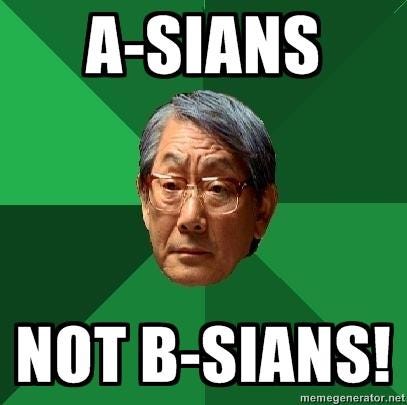What does it mean to be a member of the Asian Diaspora?
I’m filling out an application for something, and was confronted with the following question: What is your relationship to being a person of Asian Diaspora living in North America? What is meaningful for you? What is challenging?
Below is my answer. It wasn’t easy to write, but I’m glad I had the chance to write it.
One of my favorite things to coach on is identity. We all have our own stories and conflicts with it. I’d love to hear your story too.
In recent years, I’ve struggled to identify with the label “Asian,” because I find that spaces that aim to serve and represent that bloc often accidentally (or otherwise) perpetuate a majority community’s story. This question gave me so much pause. Who did I think I was to speak to a label and identity so broad as “Asian diaspora” from merely my personal lens? I looked back on moments where I’ve been drawn to other Asian folks — which I have, often, throughout my life — and reflected that a lot of that attraction reflects a small, privileged slice of what it might mean to hold this identity.
And yes, I do strongly identify “something” as Asian culture. To me, it means community joy, a strong tie between family and food, a culture of service (sometimes in excess), everyday creativity, the respect for and readiness to commune with land. Identifying with and celebrating these things matters to me.
I’m also drawn to folks who have shared similar struggles, as well. My ancestry experienced colonization and imperialism and I’m actively working through family dysfunction that resulted from that and other factors, trying to hold boundaries while staying in principled struggle within my community. I’m in an endless tug-of-war with the high-achiever, person-over-people, financial and status scarcity mindset that was imprinted on me in my youth. Throughout my life, I’ve questioned my relationship with belonging, having lived in two countries that both told me I was meant to be elsewhere.
It’s not just the shared struggle that draws me to others, it’s having a shared orientation about that struggle. It’s important to me to reject the beauty, success, spiritual, relationship standards of dominant culture. But we can’t go back to what our ancestors had. At least I can’t, because I’m American too. I find solidarity in the orientation that from here on out, we are totally walking into uncharted territory. And we get to write the story.
In the US, I’m aware that folks with an Asian diasporic context are in an interesting position regarding privilege and access. Thanks to model minority dynamics, I find that we are — as a larger community — divided on our relationship to liberatory change, the importance of academic success, and our own complicity in the forces of white supremacy. It leaves me feeling both a sense of responsibility and a desire to separate, to hide.

I want things to be different. I want to live in a simpler world, where we live as nature, in concert with the land. Where there is no property ownership or forced labor. Where people are seen for who they are and allowed to be. But that’s not the hand I was dealt. I, a child of many who came before, was granted the privilege of a life with little hunger, access to any education that I wished, and a diverse, meaningful community to hold me together. I was also given a family with wayward and often destructive patterns of love, a broken compass lacking any north star, and a map where all possible homes had been scribbled out. These are all my gifts, and I get to share them with others.
I held this question for about a week before I felt equipped to respond. During that time, on a hike with some South Asian-identifying folks who are committed to working together for environmental justice, I raised the question of “what is your relationship with being South Asian?” to the group. I shared that I’m a South Indian Tamil Brahmin, raised between two very different worlds, a child of divorce and community alienation, willing to fight for caste abolition and the end of imperialism. More than any affinity in our group, it felt empowering to be seen for who I am, and as I witnessed all of the others in that space, I felt us rowing together on the river of love.
Special thanks to Devika for helping me articulate these thoughts.


Great piece, Rishi! And fire from the first sentence: "In recent years, I’ve struggled to identify with the label “Asian,” because I find that spaces that aim to serve and represent that bloc often accidentally (or otherwise) perpetuate a majority community’s story." Needless to say, saamee.